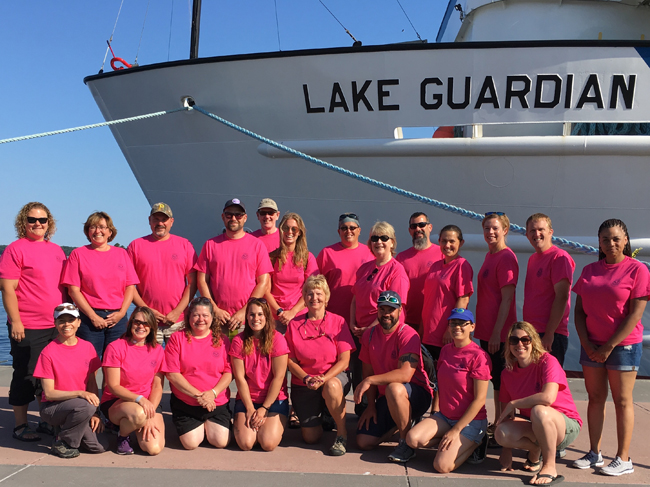
Sixteen teachers and educators from around New York and several U.S. Great Lakes states (including the ones pictured here) explored a number of locations along Lake Ontario while aboard the US Environmental
Protection Agency (EPA)’s R/V Lake Guardian in early July. Kneeling in the center of this group is Helen Domske, New York Sea Grant Coastal Education Specialist, one of the leaders of the program. Credit: Helen Domske / NYSG
New York Sea Grant and the Center for Great Lakes Literacy Provide a Unique Experience for Educators on Lake Ontario
Contact:
Helen Domske, New York Sea Grant Coastal Education Specialist, E: Hmd4@cornell.edu, P: 716-645-3610
NOTE: Video, audio and photos from the R/V Lake Guardian's July 9th launch are featured below
Buffalo, NY, July 3, 2018 - Educators from Buffalo, Amherst, Elba, Niagara Falls and other locations around the state will join colleagues from Michigan, Wisconsin and Minnesota to spend a week on Lake Ontario aboard the US Environmental Protection Agency (EPA)’s R/V Lake Guardian. These 16 teachers will work alongside researchers and scientists collecting data that will be used by the US EPA and other agencies.
New York Sea Grant Coastal Education Specialist Helen Domske and Kristin TePas, Community Outreach Specialist with Illinois-Indiana Sea Grant, will lead the week-long program that will feature sampling with state-of-the-art scientific aboard the research ship. The group will board the ship in Buffalo, before sailing through the Welland Canal and heading out to Lake Ontario.
Once on Lake Ontario, the group will conduct scientific research sampling across the lake and the mouth of the St. Lawrence River. Onboard sampling will provide teachers with an opportunity to learn first-hand about the unique ecology of Lake Ontario, as well as how people’s actions are affecting the basin. Shore stops will take place at Clayton and Oswego, NY, where educators will get to tour laboratories and interact with university researchers to further their learning experiences.
This program is part of an annual Great Lakes Shipboard Science workshop series that connects educators with scientists aboard the R/V Lake Guardian. The week-long, immersive workshop gives teachers in grades 4-12 and nature centers, a once-in-a-lifetime opportunity to work as scientists as they conduct field research across Lake Ontario.
The teachers will receive New York Sea Grant-developed lesson plans and develop their Great Lakes-focused environmental science curricula to take back to their classroom and nature centers. The lessons they learn during the workshop will be shared with students to help them learn about Great Lakes literacy and stewardship.
Domske is based at the New York Sea Grant office at the University at Buffalo, where she is Associate Director of the Great Lakes Program.
Blog posts from the educators on the "2018's Lake Ontario Shipboard Science" tour can be found via CGLL.org.
Information on Domske's educational efforts in New York's Great Lakes can be found at www.nyseagrant.org/cyeducation. There's also a #lakeguardian filter that features posts on previous tours at www.nyseagrant.org/blog.
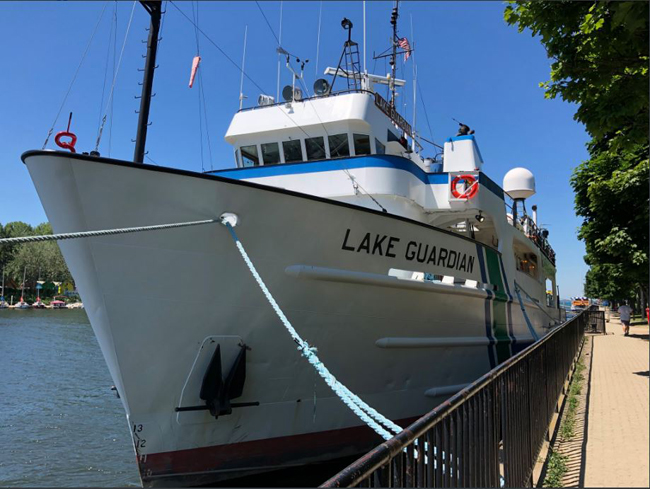
U.S. EPA's Great Lakes research vessel (R/V) Lake
Guardian was in Buffalo Harbor's port on July 9th. From there, it set
out for Lake Ontario with more than a dozen science educators aboard for
a week-long water quality sampling work cruise. Credit: TJ Pignataro / Buffalo News
On YouTube: Teachers become student scientists during week on Lake Ontario
Filed by: Mike Arena, Spectrum News - Buffalo
Buffalo, NY, July 9, 2018 - School may be out for summer, but class is in session for 16 teachers who will spend a week on the waters of Lake Ontario.
The group will help collect water and sediment samples, conduct experiments and learn about the overall health of the lake.
"Many people that live in cities don't understand how their day-to-day activities affect the lake and the deep lake, where the fisheries are and there are connections, and how we deal with waste water," said Fred Luckey, an environmental scientist with the Environmental Protection Agency.
The educators will climb aboard the Lake Guardian, an EPA ship that takes to the Great Lakes each summer, monitoring the freshwater bodies and serving as a kind of guardian angel.
This week of work is part of a month-long project, as the crew of the Guardian will spend four weeks studying and reporting the conditions of Lake Ontario.
"They're using the same procedures, the same equipment as any scientist would on the EPA vessel and the data they collect is part of the data the EPA will use to study Lake Ontario," said Helen Domske, a spokesperson for the New York Sea Grant.
Nine of the 16 teachers are from Western New York, and they hope the experiences on the decks on the Guardian can be shared with their students this fall.
"We can teach students about penguin populations in Antarctica or garbage patches in Bali, but to teach students about what's happening in their community is invaluable, because students get the first-hand knowledge to see how their own actions and all humans and how they lead to negative effects on the ecosystem," said Jim Damon, a science teacher at Leonardo DaVinci High School in Buffalo.
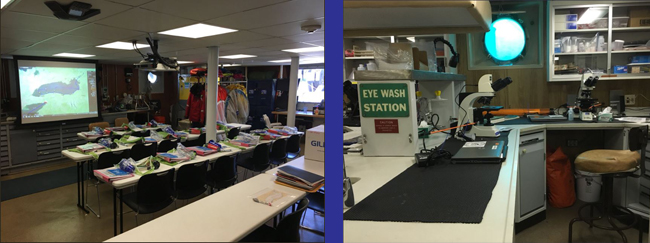
15 teachers are hitting the open water on board the Lake Guardian to help study the waters of Lake Ontario. They’ll become students themselves while collecting samples and conducting experiments. Credit: Mike Arena / Spectrum News - Buffalo
On Air: Great Lakes teachers sail away on a cruise, but it's not a tropical vacation
Filed By: Angelica A. Morrison, WBFO 88.7 FM / Great Lakes Today
If you don't see the player above, it's because you're using a
non-Flash device (eg, iPhone or iPad). You can download the mp3 file by clicking here (mp3). It may take a few minutes to download, so please be patient.
Buffalo, NY, July 10, 2018 - Sixteen teachers, several from New York State, sailed off Monday morning on research vessel called The Lake Guardian.
They'll be doing research on Lake Ontario as part of the Educate Great Lakes Teachers program. The program is hosted by the US EPA and the Sea Grant.
The group will be gathering information plankton, bacteria and taking sediment samples.
Helen Domske is the Senior Coastal Education Specialist for New York Sea Grant. Domske says the program gives teachers a chance contribute to great lakes research.
"Their entire experience is to feel like a scientist a great lakes scientist," she said.
Buffalo Science teacher Jim Damon is taking part in the trip. He's excited about the research and says he'll pass it on his students in the coming school year. He says fostering an interest in the science is important for students.
"STEM [science technology engineering and math] programming is super important," he said. "I think, with our coming generations and the way that society is going, it’s critical for students to be able to understand their role in protecting their environment."
The research ship is expected back in a week.
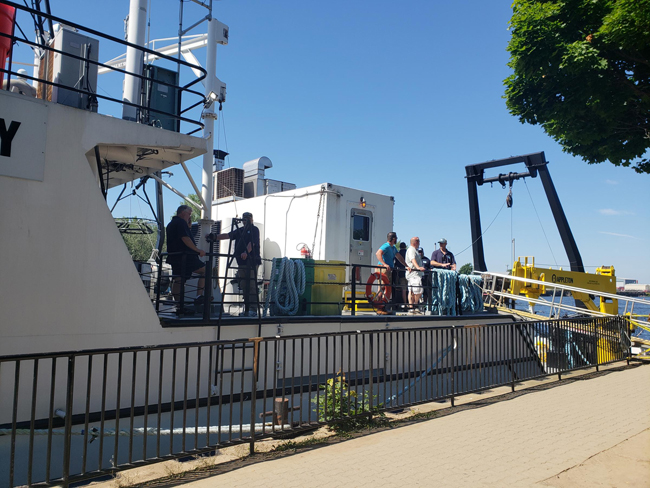
Teachers from across the Great Lakes prepare to sail away on The Lake Guardian. It's a research vessel headed for Lake Ontario. Credit: Angelica A. Morrison / WBFO
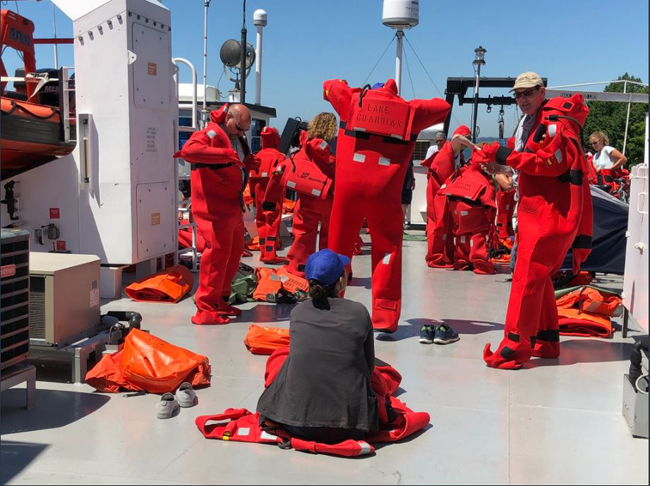
Educators learn about safety on the water aboard the U.S. Environmental Protection Agency’s R/V Lake Guardian on Monday (July 9th) in Buffalo. All those aboard were required to take part in an
emergency safety lesson (including trying on an immersion suit) on the boat's deck. Credit: TJ Pignataro / Buffalo News
In Photos: Educators set sail for ultimate Great Lakes research field trip
Filed by: T.J. Pignataro, Buffalo News
Buffalo, NY, July 13, 2018 - From September to June, educators Sarah Christopher and Jim Damon teach science to middle and high school students.
But this week, the two were students.
And their classroom was on board the U.S. Environmental Protection Agency’s 180-foot research vessel, Lake Guardian.
The two joined more than a dozen other educators from across four states for the ultimate Great Lakes research field trip.
They cruised Lake Ontario from Olcott to Sackets Harbor day and night learning about the lake’s ecosystem – and getting their hands dirty taking water samples and collecting data for analysis by federal, state and provincial scientists.
They’ll test for phosphorus loading and other water quality parameters by taking samples from the lake’s water column and sediments as part of the EPA’s binational Cooperative Science Monitoring Initiative.
What they learn on the trip – which started Monday and concludes Sunday – will be the subject of lessons in their own classrooms this fall.
“I hope to be able to share these firsthand learning experiences and be able to convey those to the students,” said Damon, a science teacher at Buffalo’s Leonardo daVinci High School. “It’s way better than what they’ll be learning from a textbook.”
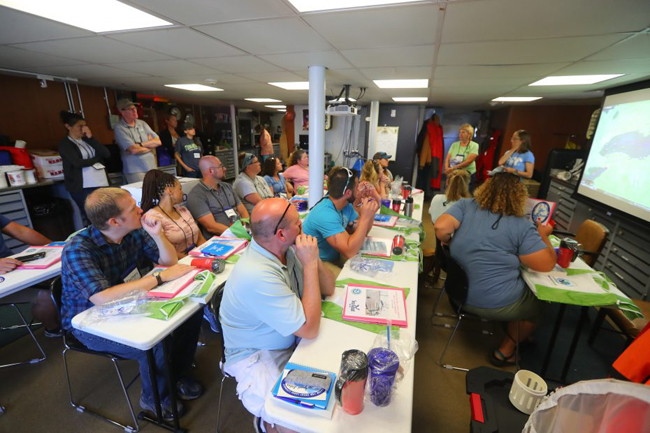
Teachers on the Lake Guardian, a research vessel operated by the U.S. Environmental Protection Agency receive orientation by crew last Monday in Buffalo. The vessel stopped overnight and ported at the Buffalo River to pick up 16 educators for a research trip on Lake Ontario that lasts until Sunday. Credit: John Hickey/Buffalo News.
Christopher, who teaches seventh-grade life science in Elba, expects to take some of her experiences back to the community via social media and a public presentation.
“I’m hoping to share some of my experiences,” Christopher said.
The northern Genesee County village is known for its onion crop – and agriculture.
Farm fertilizers and agricultural practices are often pegged as chief contributors of nutrients loading into the Great Lakes.
Testing for the levels of these nutrients – like phosphorus – and witnessing the role they play in feeding harmful algal blooms will allow Christopher to bring back information to the community about the importance of reducing the nutrients loading in the lake by best management practices, Christopher said.
Getting “buy-in” from the public is the best way to assure the Great Lakes are protected for generations to come, said Fred Luckey, an EPA environmental scientist.
“People have to be invested in the Great Lakes,” Luckey said. “The teachers are an excellent way for us to ensure we get the message across to tell the story.”
The EPA said the priority of this year’s monitoring is “to improve the understanding of nutrients entering the Lake Ontario ecosystem and their impacts on water quality and the aquatic food web.”
The teachers witnessed just how much invasive mussels have increased the water clarity in the lake over recent decades. They saw cladophora, a native algae species, and learned about how its levels can benefit or hamper lake-wide aquatic life. And, they learned how much sewage and fertilizer contribute to algal blooms in places like Irondequoit Bay and other spots.
“Until you’re out there, you experience it in entirely different ways,” Luckey said. “It’s the experience that helps you fully understand what you’re doing.”
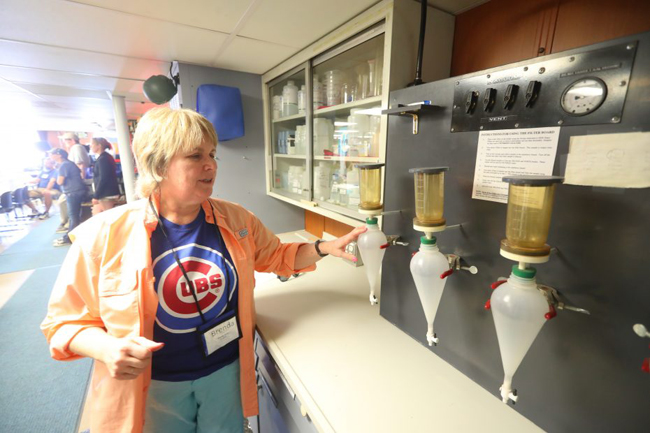
EPA scientist Brenda Jones shows a water filtration system used for checking water samples aboard the Lake Guardian. Credit: John Hickey/Buffalo News.
Other local educators on the cruise include Todd Shusky, a Perry High School biology teacher, and Jeremy Traverse, a Sweet Home Middle School science teacher.
Helen Domske of New York Sea Grant helped lead the workshop.
Three researchers – from the EPA, the University at Buffalo and SUNY College of Environmental Science and Forestry – are also aboard.
After the educators return to port on Sunday, the Lake Guardian will return to Lake Ontario for about another two months to conduct further monitoring research on the lake as part of collaborative Great Lakes work by federal officials and those from the state Department of Environmental Conservation and Ontario.
“It’s an exciting opportunity for us to share our data together, to look at successes and what we need to improve upon,” Luckey said.
The focus of the Lake Guardian’s monitoring research rotates among each of the Great Lakes every summer, meaning it’s scheduled to return to Lake Ontario in 2023.
Last year, the Lake Guardian spent the summer on Lake Huron. In 2019, it will be on Lake Erie.
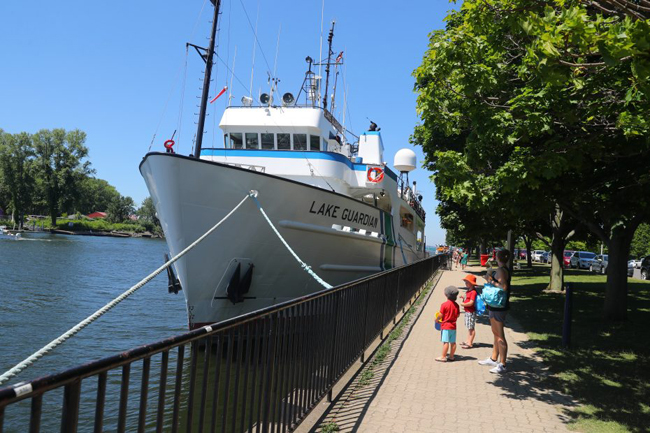
Meagan Cobello, right, and her children Marshall, 4, and Ryan, 6, check out the Lake Guardian along the Buffalo River last Monday. The Lake Guardian stopped in the area on its way to Lake Ontario for research with 16 educators from around the Great Lakes. Credit: John Hickey/Buffalo News.
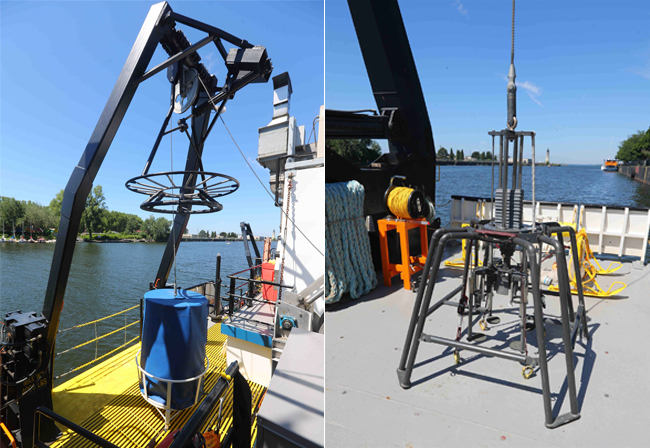
(At left) A rosette sampler is used for collecting water samples aboard the Lake Guardian. (At right) This instrument is used for sampling water and sediments on the Lake Guardian research vessel. Credit: John Hickey/Buffalo News.

There are laboratories aboard the ship to conduct studies on chemistry (at left) and biology (at right). Credit: John Hickey/Buffalo News.
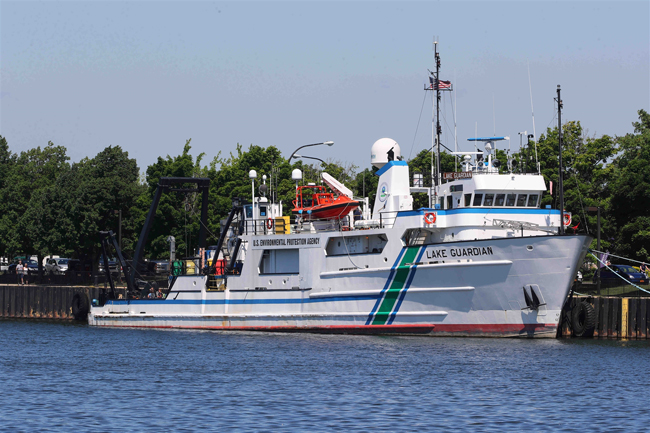
The Lake Guardian, a research vessel operated by the Environmental Protection Agency, stopped at the Buffalo River and Inner Harbor in Buffalo on Monday, July 9, 2018, to pick up 16 educators for a research trip on Lake Ontario. Credit: John Hickey/Buffalo News.
More Info: New York Sea Grant
New York Sea Grant (NYSG), a cooperative program of Cornell University
and the State University of New York (SUNY), is one of 33 university-based
programs under the National Oceanic and Atmospheric Administration’s
National Sea Grant College Program.
Since 1971, NYSG has represented a statewide network of integrated
research, education and extension services promoting coastal community
economic vitality, environmental sustainability and citizen awareness
and understanding about the State’s marine and Great Lakes resources.
Through NYSG’s efforts, the combined talents of university scientists
and extension specialists help develop and transfer science-based
information to many coastal user groups—businesses and industries,
federal, state and local government decision-makers and agency managers,
educators, the media and the interested public.
The program maintains Great Lakes offices at Cornell University, SUNY
Buffalo, SUNY Oswego and the Wayne County Cooperative Extension office
in Newark. In the State's marine waters, NYSG has offices at Stony Brook
University in Long Island, Brooklyn College and Cornell Cooperative
Extension in NYC and Kingston in the Hudson Valley.
For updates on Sea Grant activities: www.nyseagrant.org has RSS, Facebook, Twitter, and YouTube links. NYSG offers a free e-list sign up via www.nyseagrant.org/nycoastlines for its flagship publication, NY Coastlines/Currents, which is published quarterly. Our program also produces an occasional e-newsletter,"NOAA Sea Grant's Social Media Review," via its blog, www.nyseagrant.org/blog.